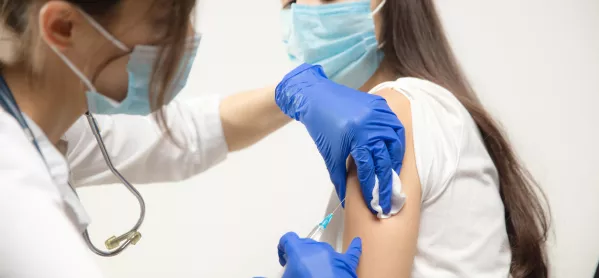Covid-19 vaccines for healthy children aged between 12 and 15 are not being recommended by the government’s vaccine advisers.
The Joint Committee on Vaccination and Immunisation (JCVI) has announced that it is widening the so-far limited rollout to more children in this age bracket who have underlying health conditions.
But it is not recommending mass vaccination of children aged between 12 and 15.
Ministers are expected to now seek extra advice on the wider benefits of vaccinating 12- to 15-year-olds, with the UK’s four chief medical officers being asked to lead this process.
Vaccines: Government urged to give Covid vaccine to pupils over age 12
Attendance: Covid absence doubles in a week in Scotland
Schools: Sajid Javid says schools could play role in vaccinating 16- and 17-year-olds
The review will not consider any benefits that adults may experience due to having children vaccinated, but rather will focus on areas outside the JCVI’s remit.
This would include lost education time due to Covid-related absences, either through sickness or being sent home from school.
Covid and schools: Should younger teenagers be given vaccine?
The review is expected to take several days.
The Covid vaccination programme is being extended from what had been considered the most at-risk children to include children with chronic major heart, lung, kidney, liver and neurological conditions.
It means about 200,000 more children will be invited for vaccines.
The decision comes exactly a week after the Department of Health and Social Care (DHSC) confirmed that preparations were underway to ensure the NHS was ready to offer coronavirus jabs to all 12- to 15-year-olds in England from early September.
The department said it wanted to be “ready to hit the ground running”.
But the committee decided that, under its precautionary approach, the benefit from a pure health perspective was not large enough to support the mass vaccination of 12- to 15-year-olds.
The JCVI investigated the extremely rare events of inflammation of the heart muscle, known as myocarditis, after Pfizer or Moderna vaccines.
The condition can result in short periods of hospital observation, followed by typically swift recoveries, but the JCVI has concluded that the medium- to long-term outcomes are still uncertain and more follow-up time is needed to get a clearer picture.
Health secretary Sajid Javid said he was “grateful” for the expert advice from the committee, adding that he and other health ministers from across the UK have written to the chief medical officers to “ask that they consider the vaccination of 12- to 15-year-olds from a broader perspective, as suggested by the JCVI”.
He added: “We will then consider the advice from the chief medical officers, building on the advice from the JCVI, before making a decision shortly.”
